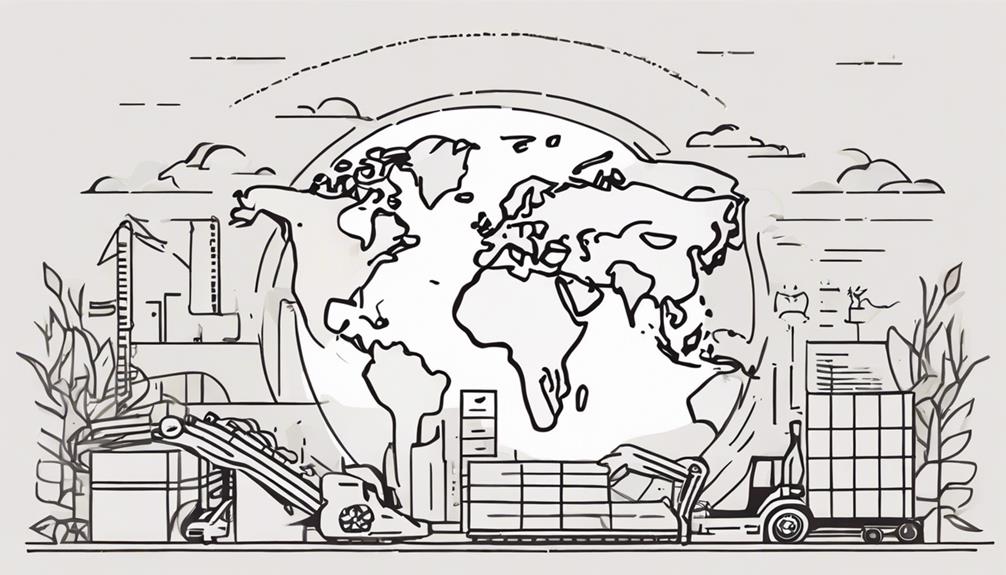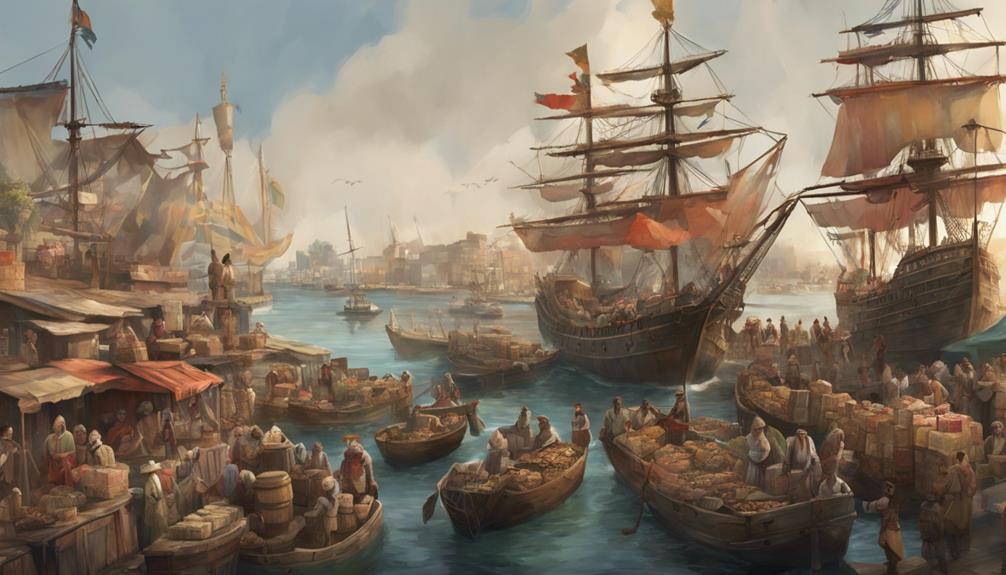Trade, the cornerstone of economic interactions on a global scale, serves as a fundamental driver of growth and development for nations. The intricate web of exchanges between countries raises questions about the motivations behind such transactions. What compels nations to engage in trade, and why is it considered essential for their prosperity? By unraveling the complexities of trade dynamics and examining the underlying principles that govern international commerce, we can shed light on the compelling reasons that drive countries to participate in trade relationships, ultimately shaping the economic landscape in profound ways.
Key Takeaways
- Trade optimizes production efficiency and leverages comparative advantages.
- Countries exchange goods and services to benefit from specialization.
- Trade relationships enhance productivity, expand market opportunities, and foster economic development.
- Global trade dynamics are influenced by technology, demand fluctuations, and government policies.
Understanding International Trade

International trade is a fundamental economic concept essential for countries seeking to optimize production efficiency and capitalize on comparative advantages in the global market. Countries engage in international trade to exchange goods and services, aiming to benefit from specialization and access products they cannot produce domestically. By leveraging their resources and skills, countries can achieve a more efficient allocation of production, leading to economic growth. Understanding comparative advantage is crucial in explaining why countries participate in trade, as it allows for the maximization of productivity and mutual benefits. The dynamics of global trade are influenced by various factors such as technology, demand fluctuations, and government policies, shaping the interconnected nature of the global economy. Through international trade, countries can enhance their productivity, expand market opportunities, and foster economic development on a global scale. It is through this exchange of goods and services that nations can harness their strengths and contribute to the advancement of the global economy.
Importance of Imports and Exports
Imports and exports play a crucial role in a country's economy by facilitating access to a wider range of goods and services through imports and by generating revenue and creating job opportunities through exports. The balance between imports and exports is a key indicator of a country's economic health, impacting factors such as trade balance and economic growth. Understanding the importance of imports and exports is essential for comprehending how countries interact in the global market and how trade influences their economic prosperity.
Role of Imports
Crucial to a nation's economic landscape is the role played by imports in facilitating access to a diverse array of goods and services essential for meeting consumer demands and fostering economic growth.
- Imports provide countries with access to goods and services not available domestically.
- Importing goods allows countries to benefit from cost-effective production methods and specialized expertise from other nations.
- The balance of imports and exports shapes a country's trade dynamics and influences its overall economic performance.
Benefits of Exports
Given the pivotal role that imports play in a nation's economic framework, it is imperative to explore the substantial benefits that exports bring to the table in driving economic growth and bolstering a country's global standing. Exports are fundamental for economic growth, constituting a significant portion of a country's GDP. They not only create job opportunities and stimulate investment but also enhance a nation's competitiveness in the global market. By earning foreign exchange, exports enable countries to pay for imports and service foreign debt. Diversifying export markets reduces dependency risks, enhancing resilience to economic shocks. Moreover, a robust export sector improves a country's trade balance, fosters innovation, and drives overall economic development, solidifying its position in the global market.
Global Trade Impact
How does the intricate distribution of goods globally based on skills and materials availability shape the complex trade relationships in the global market? Imports and exports are vital components of global trade, encompassing final products and intermediate parts/services within value chains. The OECD analyzes trade in value-added terms to unravel the intricate dynamics of global trade. Trade statistics often overlook the interconnectedness among nations, hindering a comprehensive understanding of global trade. Recognizing the significance of imports and exports is key to grasping the impact of international trade on the global economy.
- Imports and exports are crucial for global trade, involving both final products and intermediate parts/services within value chains.
- The OECD utilizes value-added measurements to dissect the complexities of global trade dynamics.
- Trade statistics frequently fail to capture the full nature of global trade, particularly the interconnectedness of various countries.
Comparative Advantage in Trade
In the realm of international trade, the concept of comparative advantage plays a pivotal role in determining the efficiency and mutual benefits derived by countries engaging in trade. Countries benefit from trading according to their comparative advantage, enabling them to produce goods more efficiently. This specialization based on comparative advantage leads to increased productivity and efficiency, allowing countries to focus on producing goods where they have a relative efficiency edge.
Trade patterns are significantly influenced by factors such as factor endowments and technological advancements. Countries with abundant resources of a particular factor, like labor or capital, are more likely to specialize in industries that make intensive use of those resources. This specialization not only enhances the variety of products available in the market but also leads to efficiency gains in investment spending, ultimately benefiting all trading partners involved.
In essence, comparative advantage in trade fosters a system where countries can optimize their production processes, allocate resources more effectively, and capitalize on their unique strengths to create a mutually beneficial environment for global trade.
Benefits of Global Trade

Global trade, through enhanced market opportunities and economic growth, facilitates the exchange of goods and services between nations. This process contributes to improved efficiency, increased productivity, and overall economic welfare for trading countries. However, it can also spark challenges like domestic industry competition and potential opposition from affected producers.
Economic Growth Through Trade
International trade plays a pivotal role in fostering economic growth through the interconnectedness of global markets. Countries benefit from specialization and comparative advantage, enhancing efficiency and productivity in producing goods. This leads to innovation, competitiveness, and economic development. Increased trade not only drives growth but also raises living standards by promoting diversity in markets and improving global welfare. The exchange of goods and services enabled by trade allows for a wider variety of products, enhancing consumer choices and overall quality of life. Through these mechanisms, global trade contributes significantly to economic growth, with over 50% of total global exports stemming from international trade.
Increased Market Opportunities
Trade expansion generates a myriad of market opportunities by facilitating access to diverse products and services worldwide, thereby enriching consumer choices and fostering economic growth. Global trade allows countries to tap into a broader range of goods and services, enhancing domestic markets with foreign offerings. This international exchange not only benefits consumers by providing access to unique products but also enables businesses to expand their reach beyond national borders, increasing competitiveness and driving innovation. Through global trade, companies are pushed to improve efficiency and product quality to meet the demands of a worldwide market. By leveraging comparative advantages, countries can specialize in areas where they excel, leading to enhanced productivity and overall economic prosperity.
| Benefits of Global Trade |
|---|
| Access to diverse products and services worldwide |
| Enhanced consumer choices |
| Expanded customer base beyond national borders |
| Increased competition driving innovation |
| Specialization for maximizing productivity and economic growth |
Free Trade Principles
Advocating for open markets and competition devoid of government intervention, free trade principles emphasize efficiency and the allocation of resources based on comparative advantages. Free trade agreements aim to foster economic growth and global economic development by eliminating tariffs and trade barriers. Here are three key points highlighting the significance of free trade principles:
- Efficiency: Free trade allows countries to specialize in producing goods and services in which they have a comparative advantage. This specialization leads to increased efficiency and overall productivity.
- Comparative Advantage: By focusing on what they can produce most efficiently, countries can benefit from trading with others who have different comparative advantages. This results in a more efficient allocation of resources globally.
- Economic Growth: Free trade promotes economic growth by expanding market opportunities, encouraging innovation, and fostering healthy competition. Countries engaged in free trade often experience higher levels of economic growth and development.
Protectionist Policies in Trade

In contrast to the principles of free trade that prioritize efficiency and comparative advantage, the implementation of protectionist policies in trade introduces measures aimed at shielding domestic industries from foreign competition. Protectionist policies encompass tools such as tariffs, quotas, and subsidies that restrict imports, leading to higher prices for consumers and potentially reducing overall economic efficiency. These policies can also provoke trade wars between countries, escalating tensions and impacting global economic stability. Critics argue that protectionist measures hinder innovation, limit consumer choice, and may result in retaliation from trading partners. Despite offering short-term benefits for certain industries, protectionism can ultimately harm long-term economic growth and development.
| Protectionist Policies | Impact on Economy |
|---|---|
| Tariffs | Increase consumer prices |
| Quotas | Limit market access |
| Subsidies | Distort competition |
Business Benefits of International Trade
Businesses engaging in international trade can leverage various advantages to enhance their competitiveness and expand their market reach. International trade offers several benefits for businesses:
- Access to New Markets: By trading internationally, businesses can reach new countries and tap into a larger customer base, increasing sales and market share.
- Cost Efficiencies: Companies can benefit from cost efficiencies by sourcing materials or services from countries with lower production costs, reducing overall expenses and improving profitability.
- Diversification of Revenue Streams: Exporting goods internationally allows businesses to diversify their revenue streams, reducing reliance on any single market and providing stability in uncertain economic conditions.
Through international trade, businesses can capitalize on their comparative advantages, offer unique goods and services globally, and foster collaborations that drive innovation and growth. This strategic approach not only benefits individual companies but also contributes to the overall economic development of countries involved in international trade.
Factors Driving International Trade

Having explored the business benefits of international trade, the dynamics of global commerce are significantly influenced by various factors that drive and shape trade relations between countries. Factors driving international trade encompass a broad spectrum, including comparative advantage, technological advancements, economic factors, government policies, labor laws, education, natural resources, and demand variations.
The concept of comparative advantage, where countries specialize in producing goods or services more efficiently than others, plays a pivotal role in driving international trade. Technological advancements and innovations contribute to the expansion of trade by improving productivity and creating new products. Economic factors such as inflation rates, exchange rates, and economic growth impact trade patterns and volumes.
Moreover, government policies and regulations shape the environment in which international trade occurs, influencing trade agreements, tariffs, and market access. Labor laws and workforce skills also impact trade dynamics, as educated and skilled labor forces can enhance a country's competitiveness in the global market. Understanding and leveraging these diverse factors are crucial for countries to navigate the complexities of international trade effectively.
Common Trade Barriers
Trade barriers are regulatory measures implemented by governments to restrict the flow of goods and services across borders. Common trade barriers include subsidies, tariffs, quotas, import/export licenses, and product standardization requirements. These barriers serve to protect domestic industries and address market inefficiencies.
- Subsidies, such as financial assistance to domestic producers, impact international competitiveness.
- Tariffs, which are taxes on imported goods, raise prices and lower demand for foreign products.
- Quotas control the quantity of specific imports, managing market supply and safeguarding local producers.
Division of Labor in Trade

The efficient allocation of specialized tasks characterizes the division of labor in trade, leading to enhanced productivity and global market competitiveness. By breaking down production processes into smaller, specialized tasks, the division of labor in trade ensures that each task is carried out efficiently and by individuals with specific skills. This specialization results in increased productivity as workers become highly proficient in their assigned tasks, ultimately contributing to mass production and the generation of surplus goods.
Specialization plays a crucial role in the global market by enhancing the quality and quantity of products available. Through the division of labor in trade, countries can focus on producing goods and services where they have a comparative advantage, further boosting efficiency and overall output. As a result, the products entering the global market are of higher quality and are more competitively priced, driving innovation and economic growth on an international scale. In essence, the division of labor in trade is a fundamental component in achieving efficiency, productivity, and success in the interconnected world of trade.
Specialization's Role in Trade
Specialization plays a crucial role in trade by enabling countries to focus on producing goods they excel in, leading to increased productivity and efficiency. This strategic allocation of resources based on comparative advantage not only benefits individual nations but also fosters mutual gains in global trade. By diversifying products and services through specialization, countries can enhance economic development and contribute to a more interconnected and dynamic global trade landscape.
Benefits of Specialization
Efficiency and productivity in production are significantly enhanced through the process of specialization in international trade, allowing countries to focus on their comparative advantages. Specialization brings various benefits:
- Enhanced Efficiency: By concentrating on specific goods and services, countries can streamline their production processes, leading to increased efficiency.
- Higher Productivity Levels: Specialization allows for the utilization of resources in the most effective manner, resulting in higher productivity levels.
- Promotion of Mutual Gains: Specialization based on comparative advantage fosters mutual gains in trade relationships, as countries can exchange goods they produce efficiently for those they do not.
Increased Efficiency in Trade
Maximizing productivity and output within the global market, countries strategically focus on producing goods where they hold a comparative advantage. This specialization allows for increased efficiency in resource allocation and utilization in international trade. By concentrating on specific goods or services where they excel, countries can optimize their productivity levels, leading to lower costs in the production process. The enhanced efficiency through specialization not only benefits the trading countries by lowering costs but also facilitates smoother trade relationships. Moreover, this increased efficiency promotes economic growth as countries can leverage their strengths effectively in the global market. Overall, specialization based on comparative advantage plays a crucial role in driving productivity, resource allocation efficiency, and economic growth in international trade.
Diversification of Products
In the realm of international trade, the strategic diversification of products plays a pivotal role in enhancing countries' economic competitiveness and leveraging their unique resources and skills. Through specialization, countries can capitalize on their comparative advantage, leading to increased efficiency and productivity in specific goods. Diversification of products enables nations to maximize their resources, enhance global market competitiveness, and reap the benefits of trade by trading their unique products for a wider variety of goods.
- Specialization in trade allows countries to focus on producing goods where they have a comparative advantage.
- It leads to increased efficiency and productivity in the production of specific goods.
- Diversification of products through specialization helps countries maximize their resources and skills.
Advantages of Trade Relationships
Fostering trade relationships between countries contributes significantly to economic growth and global interconnectedness. International trade allows countries to leverage their comparative advantages, leading to a myriad of benefits. One of the primary advantages is increased competition, which drives efficiency and innovation, ultimately lowering prices for consumers. Moreover, trade enables countries to access a wider variety of goods and services that may not be available domestically, enhancing consumer choice and overall societal welfare. Importantly, trade relationships stimulate innovation and technological advancements within industries as companies strive to remain competitive in the global market. Foreign producers also benefit by expanding their sales and earning foreign exchange through these relationships. By importing efficiently produced goods, countries can improve their economic efficiency and enhance societal welfare, making international trade a cornerstone of economic development.
| Advantages of Trade Relationships | |||
|---|---|---|---|
| Increased competition | Lower prices | Enhanced choice | Innovation |
| Access to variety of goods/services | Technological advancements | Foreign exchange | Societal welfare |
Disadvantages of International Trade

While trade relationships offer numerous advantages such as increased competition and access to a variety of goods, it is imperative to acknowledge the potential drawbacks associated with international trade.
- Over-specialization: International trade can lead to over-specialization, resulting in job losses in certain industries as the economy becomes too dependent on specific sectors.
- Cheaper imports: Some domestic industries may struggle to compete with cheaper imports in the global market, leading to a decline in their market share and profitability.
- Disruption of domestic market: Cheaper imported goods can harm local producers and disrupt the domestic market by creating uneven competition and potentially driving domestic businesses out of the market.
These factors highlight the complexities of international trade and the need for countries to carefully consider the long-term impacts on their domestic industries and labor markets. Structural unemployment, caused by shifts in comparative advantage and market dynamics, can pose significant challenges for economies heavily reliant on international trade.
Patterns of Global Trade
The distribution of goods production across nations based on their respective skills and material availability significantly influences the patterns observed in global trade. 30% of global trade involves the export of final products, while the remaining 70% consists of intermediate parts, components, and services within global value chains. This distribution of production reflects the interconnectedness of countries in producing goods and services across borders, shaping the dynamics of global trade. To gain a better understanding of these complexities, organizations like the OECD measure trade in value-added terms. However, traditional trade statistics often fail to capture the intricate nature of global trade, particularly when it involves multiple countries and stages of production. By recognizing the importance of comparative advantage and the intricacies of production distribution, we can better comprehend the patterns that emerge in global trade and the role of global value chains in shaping the modern economy.
Comparative Advantage Explained

Countries strategically engage in international trade by leveraging their respective skills and resources to specialize in producing goods where they hold a comparative advantage. This economic principle, known as comparative advantage, allows countries to focus on what they do best and trade with others for goods and services they are not as efficient in producing. Here are key points to understand comparative advantage:
- Efficiency: Specializing in products where countries have a comparative advantage leads to increased efficiency in production processes.
- Mutual Gains: By trading based on their respective strengths, countries can achieve mutual gains through the exchange of goods and services.
- Economic Welfare: The concept of comparative advantage ultimately contributes to overall economic welfare by maximizing productivity and facilitating trade that benefits all parties involved.
Frequently Asked Questions
What Is Trade and Why Do Countries Do It?
Economic exchange between countries, known as trade, occurs to facilitate the movement of goods and services in global markets. Nations engage in trade to capitalize on their comparative advantages, benefiting from specialization and increased efficiency. The import-export dynamics, influenced by tariffs and trade agreements, shape the international trade landscape. Such interactions foster economic growth, innovation, and resource allocation efficiency on a global scale.
What Are the Reasons for Trade?
Trade is driven by comparative advantage, enabling countries to specialize in goods they produce efficiently. This specialization leads to increased productivity, economic growth, and improved resource allocation. Tariff barriers are reduced, fostering global interdependence and market access. Through trade, nations benefit from a wider variety of products, enhancing consumer choice and overall economic efficiency.
What Is the Trade Between Countries?
Trade between countries is akin to a synchronized dance of imports and exports, shaping the global economy. Through trade agreements, nations navigate tariffs and barriers to leverage their comparative advantages. The trade balance reflects the flow of goods and services, with free trade fostering economic growth and resource optimization. Understanding the intricate web of international trade dynamics is crucial for nations seeking prosperity and efficiency in the interconnected world economy.
What Are the Basic Reasons Why Nations Trade With Each Other?
Nations engage in trade for various reasons, such as seeking economic benefits, sharing resources, accessing new markets, and promoting innovation through specialization. Trade also fosters cultural exchange, boosts competitiveness, creates jobs, and facilitates technology transfer. Additionally, it can lead to tariff reductions, environmental impacts, risk diversification, and the formation of political alliances. Overall, trade plays a crucial role in global cooperation and the advancement of nations' welfare and development.
Conclusion
In conclusion, international trade plays a crucial role in promoting economic growth, innovation, and global connectivity. One interesting statistic to highlight is that according to the World Trade Organization, global trade has increased by an average of 2.1% annually since 2010. This steady growth reflects the importance of trade in driving prosperity and development around the world.
